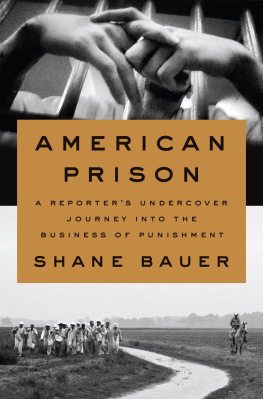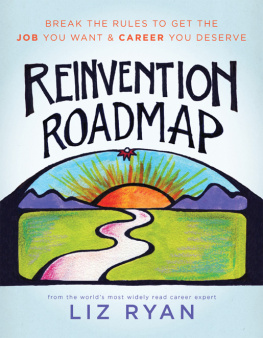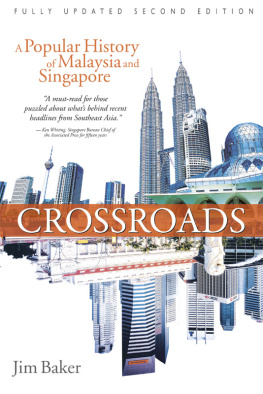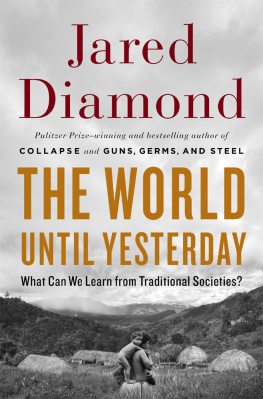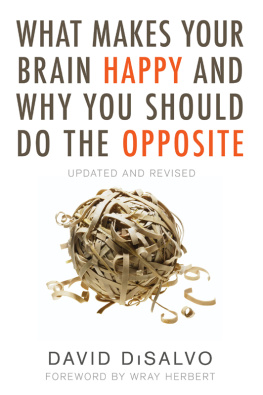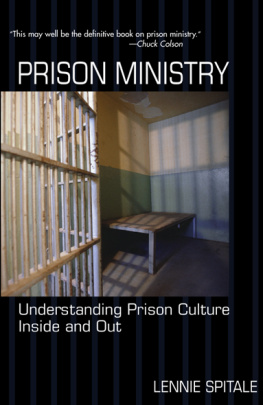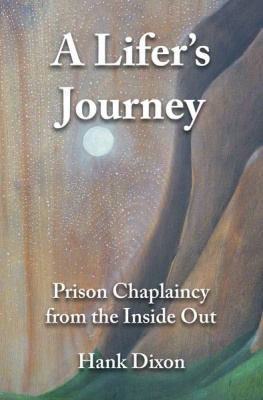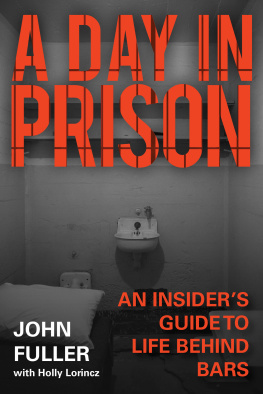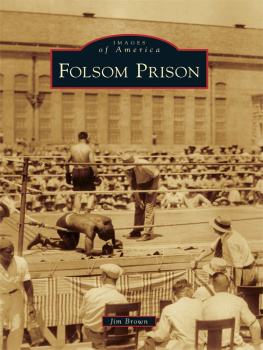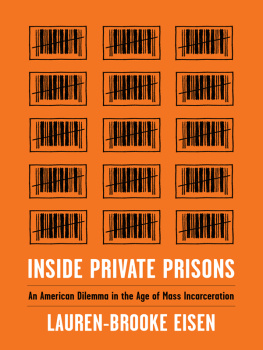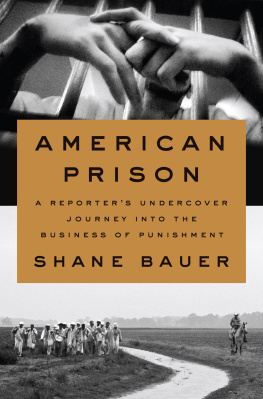ALSO BY SHANE BAUER
(WITH JOSHUA FATTAL AND SARAH SHOURD)
A Sliver of Light: Three Americans Imprisoned in Iran
PENGUIN PRESS
An imprint of Penguin Random House LLC
375 Hudson Street
New York, New York 10014
penguinrandomhouse.com
Copyright 2018 by Shane Bauer
Penguin supports copyright. Copyright fuels creativity, encourages diverse voices, promotes free speech, and creates a vibrant culture. Thank you for buying an authorized edition of this book and for complying with copyright laws by not reproducing, scanning, or distributing any part of it in any form without permission. You are supporting writers and allowing Penguin to continue to publish books for every reader.
Portions of this book appeared, in different form, in My four months as a prison guard in Mother Jones. Used by permission of Mother Jones.
LIBRARY OF CONGRESS CATALOGING-IN-PUBLICATION DATA
Names: Bauer, Shane, author.
Title: American prison : a reporters undercover journey into the business of punishment / Shane Bauer.
Description: New York City : Penguin Press, 2018. | Includes bibliographical references and index.
Identifiers: LCCN 2018018293 (print) | LCCN 2018021131 (ebook) | ISBN 9780735223592 (ebook) | ISBN 9780735223585 (hardback)
Subjects: LCSH: PrisonsUnited States. | ImprisonmentUnited States. | BISAC: POLITICAL SCIENCE / Political Freedom & Security / Law Enforcement. | POLITICAL SCIENCE / Labor & Industrial Relations. | POLITICAL SCIENCE / Political Freedom & Security / Civil Rights.
Classification: LCC HV9471 (ebook) | LCC HV9471 .B384 2018 (print) | DDC 365/.973dc23
LC record available at https://lccn.loc.gov/2018018293
MAP BY JEFF WARD
Some names and identifying characteristics have been changed to protect the privacy of the individuals involved.
Cover design: Christopher Brian King
Cover photographs: (top) Shane Bauer / Mother Jones; (bottom) Bruce Jackson
Version_2
For the prisoners in America
We all want to believe in our inner power, our sense of personal agency, to resist external situational forces of the kinds operating in this Stanford Prison Experiment.... For many, that belief of personal power to resist powerful situational and systemic forces is little more than a reassuring illusion of invulnerability.
Philip Zimbardo
You just sell it like you were selling cars, or real estate, or hamburgers.
Corrections Corporation of America cofounder Thomas Beasley
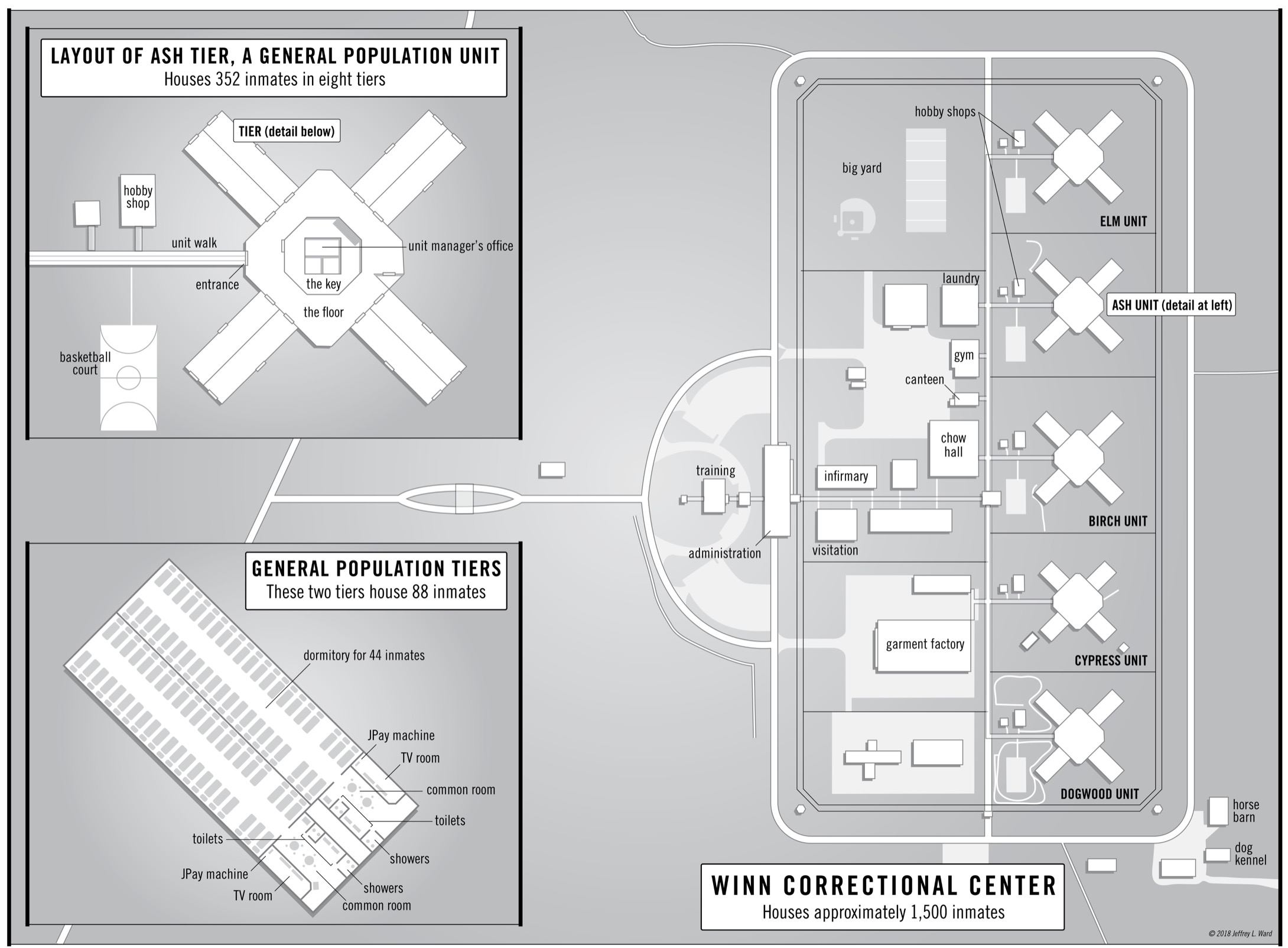
INTRODUCTION
Have you ever had a riot? I ask a recruiter from the Corrections Corporation of America.
The last riot we had was two years ago, he says over the phone.
Yeah, but that was with the Puerto Ricans! a womans voice cuts in. She hasnt spoken until this moment. We got rid of them. Now we just have people from Oklahoma.
He reads me questions. There are times that people disagree. When was the last time you disagreed with someone? How did you work it out? A supervisor wants to send you to a seminar on a topic you arent interested in. How do you react? He isnt interested in the details of my resume. He doesnt ask about my job history, my current employment with the Foundation for National Progress, publisher of Mother Jones magazine, or why someone who writes about criminal justice in California would want to move across the country to work in a prison. Its all in my application: My real name, my personal information, the fact that I was arrested for shoplifting when I was nineteen. Did he Google me? A quick search would have brought up my prison reporting and articles about the two years I spent as a prisoner in Iran. He doesnt ask about many of the things I feared he would, so I dont bring them up.
I am tempted to ask him about the results of the survey I took on CCAs website, testing my instincts about working in a prison. It provided various scenarios, and I was to choose from multiple choices how I would be most likely to respond: An inmate receives a food tray and eats all the food except the dessert (pudding). The inmate then walks to the food line and asks for a new tray of food because there is hair in the pudding. Would I replace the whole tray, the dessert only, or ignore him? An inmate tells you that she thinks you dont like her because of her race. Do I tell her shes wrong? Ignore her? Tell her that, in fact, she is the one who is racist?
Then there was the section in which, next to dozens of statements, I clicked buttons ranging from strongly agree to strongly disagree:
If someone insults you, he/she is asking for a punch in the mouth or worse. Disagree.
I am a very productive worker. Strongly agree.
I always support the decisions of my boss. Neither agree nor disagree.
I have a very strict moral code. Strongly agree.
I wouldnt trade my life for anything.
On that last one I clicked strongly agree, though after I submitted my application to a handful of CCA prisons around the country, I worried that my answer might have made them less likely to hire me.
The man on the phone tells me I would go through four weeks of training. Then I would be expected to work twelve hours a day and sometimes sixteen.
When can you start? he asks.
I tell him I need to think it over.
I take a breath. Am I really going to become a prison guard? Now that it might actually happen, it feels scary and a bit extreme.
I began applying for jobs in private prisons because I wanted to see the inner workings of an industry that holds some 130,000 of our nations 1.5 million prisoners. As a journalist, its nearly impossible to get an unconstrained look inside our penal system. When prisons do let reporters in, its usually for carefully managed tours and monitored interviews with inmates. Many states dont allow reporters to choose who they want to interview; the prison administration chooses for them. Phone calls are surveilled and letters are opened and read by guards. Inmates who talk freely to a reporter risk retaliation, including solitary confinement. Private prisons are especially secretive. Their records often arent subject to public access laws; CCA has fought to defeat legislation that would make private prisons subject to the same disclosure rules as its public counterparts. And even if I could get uncensored information from private prison inmates, how would I verify their claims? I keep coming back to this question: Is there any other way to see what really happens inside a private prison?
But now that this is becoming real, there is a competing question: Am I really going back to prison? It has only been three years since my own incarceration ended. In 2009 I was working as a freelance reporter in the Middle East, living in Damascus with my partner, Sarah Shourd. When our friend Josh Fattal came to visit, we took a trip to Iraqi Kurdistan, which at that time had a growing tourist industry and was considered safe for Western visitors. During a long hike near a local tourist site, we unknowingly neared the Iranian border. The three of us were arrested and driven across the country to Irans Evin prison, where we would be interrogated for months while being kept in solitary confinement. Josh and I would be celled together after four months, but Sarah would spend more than a year in isolation before being released in 2010. Josh and I would get out after twenty-six months inside.

